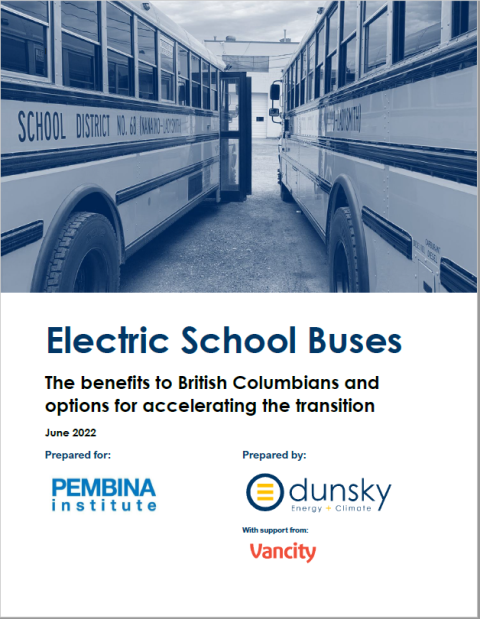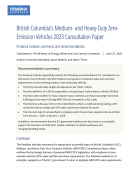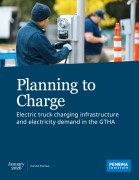In the CleanBC Roadmap to 2030, the government signalled a long-term goal of decarbonizing all medium and heavy-duty vehicles in the province. This goal supports B.C.’s sectoral target to reduce transportation emissions by 27-32% by 2030.
New research commissioned by Pembina Institute shows that the electrification of school buses represents an opportunity for the B.C. government to achieve meaningful progress on the province’s GHG target while generating complementary long-term health and economic benefits for the province. Compared to other sectors of the economy in need of rapid decarbonization, the B.C. government has a great deal of influence over the procurement of publicly owned school buses.
Electric school buses are now viable options for fleet managers. Between 2021 and 2022, B.C.’s subsidy programs helped electrify approximately 4% of the public sector fleet. However, barriers to adoption remain. The purchase price is still up to three times the cost of a diesel equivalent and at current provincial subsidy levels, school districts must budget at least $93,000 for Type C buses and $133,000 for Type D buses, to cover the remaining difference between diesel and electric models. Federal loans and contributions are also available from the Canada Infrastructure Bank and Zero Emission Transit Fund (ZETF), but many school districts have remained hesitant to take on debt and ZETF applications can be seen by some as administratively burdensome. Beyond the purchase of the bus, school districts also need to invest in charging infrastructure, potential electrical upgrades and skills training.
Therefore, it is critical that the B.C. government continue to help school districts bridge the gap between the acquisition costs of traditional diesel buses and clean electric buses. New research shows that despite these challenges, the benefits of electrifying buses outweigh the costs.
Recommendations for the government of British Columbia
- Set a target for near 100% of new public sector school bus purchases to be zero emission by 2030
- Include a strategic roadmap for accelerating electric school bus adoption and overcoming common barriers to adoption in the forthcoming 2023 Transportation Action Plan.
Benefits of electric school buses
The Pembina Institute commissioned Dunsky Energy + Climate Advisors to complete the report, “Electric School Buses: The benefits to British Columbians and options for accelerating the transition,” to quantify potential health, emissions, and economic benefits.
The report finds that electrifying the approximately 1,280 buses owned by school districts could, over an average bus lifetime of 12 years:
- Improve health outcomes: Result in $15 million in health care cost savings from avoided air pollution (nitrogen oxides, sulphur oxides, and particulate matter (PM2.5), which cause premature deaths, respiratory illness, cancer, and impede the development of children’s lungs
- Reduce carbon pollution: Eliminate 92% of the GHG emissions from school buses (428 thousand tonnes CO2e)
- Improve energy security: Save school districts $212 million in energy costs and reduce exposure to rising fuel prices by switching to locally generated electricity
- Reduce operating costs for fleet owners: Save school districts over $370 million in fuel and maintenance costs
- Generate offsetting revenue from Low Carbon Fuel Standard (LCFS) credits: Potential to earn over $128 million from the sale of LCFS credits
The operating costs for electric school buses compared to their diesel counterparts can create $17,000 in savings per bus annually for school districts (bringing annual expenditures on maintenance and fuel down from approximately $23,000 to $6,000). When potential LCFS credit revenues are accounted for, school districts could be net-positive, meaning they could generate enough revenue to offset operating costs and be left with $2,600 in surplus, per bus.
As a result, after accounting for the current provincial subsidies, school districts purchasing electric school buses would see their investment outperform diesel buses in cost of ownership within 4.4 years for Type C buses and 5.8 years for Type D buses.
With the support of purchase subsidies, electric school buses are the clear winner over diesel buses for school districts, based on long-term operational savings. They also generate sizeable public health benefits and help B.C. make progress on its GHG-reduction targets. It is critical for B.C. to continue providing high levels of funding to enable rapid fleet turnover.
Note: This report was revised in July 2022 to update the lifetime GHG calculation.
Recommendations
School buses are one of the easiest modes of transportation to electrify within the Medium- and Heavy-Duty Vehicle (MHDV) sector. Between their GHG-reduction potential, operational cost-competitiveness, and reduction of harmful air pollution effects on children, electric school buses deliver significant public benefits. Based on these benefits and findings in the report, the Pembina Institute recommends the following:
- B.C. should set a target for near 100% of new public sector school bus purchases to be zero emission by 2030. B.C.’s commitment to introduce new targets for MHDV sales in alignment with California, by 2023, will need to include sub-targets for different vehicle classes and types. School buses are one of the vehicle types ready for short- to medium-term electrification. Leading research shows that a 2030 deadline for new bus sales to be zero emission is needed for Paris Agreement target-alignment. B.C. should take a leadership role by committing to accelerated adoption for the public sector fleet. Forthcoming national research from Pembina will include modelling that examines the role of accelerated zero-emission sales mandates for all MHDVs in Canada.
- B.C.’s 2023 Transportation Action Plan should include a strategic roadmap for accelerating electric school bus adoption. In line with changes to B.C.’s ZEV mandate and the sectoral target for transportation emissions, the action plan should respond to common barriers to adoption and outline the province’s roadmap for the public sector to ensure near 100% of new buses are zero-emission starting in 2030. The plan should also address how the Ministry of Education’s Bus Acquisition program can be adjusted and receive more funding over the medium-term to begin subsidizing electric bus purchases by default, rather than supplement with subsidies from the Go Electric program.







